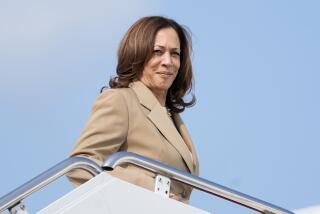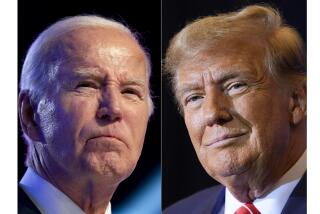GOP’s Also-Rans Face Uphill Fight for Support : Politics: Stalled start forces pack to focus on Iowa, New Hampshire contests to make their mark. Early triumphs may not be enough, analysts say.
- Share via
For months they have wallowed unappreciated and unheard, the national obsession with the O.J. Simpson trial and the lengthy will-he-or-won’t-he conundrum of Colin L. Powell setting their feet in concrete as surely as if they had offended Al Capone.
For the Republican presidential contenders chasing pacesetter Bob Dole, there is suddenly running room. The only question: After being stalled for so long, can they still get it in gear?
Why, of course , say most of the nine also-rans, currently vying not so much for the front-runner’s mantle but just to be considered the anti-Dole.
Of course , say political types who have been through this before, knowing that the political world dreads more than anything a front-runner’s yawning, boring walk to the nomination.
Still, the challengers face an uphill battle, and analysts say they believe that the dynamic of the race now has conspired, more than ever before, to place all the marbles in two familiar baskets--the Iowa caucus on Feb. 12 and the New Hampshire primary on Feb. 20.
Until those two events roll around, the analysts say, the contenders have little hope of generating much excitement.
“The problem the candidates have now is that other than the press and political insiders, the folks aren’t interested. . . . If they aren’t paying attention, voters don’t change their minds,” said Sal Russo, a California-based GOP consultant who is unofficially advising candidate Malcolm S. (Steve) Forbes Jr.
And history suggests that even if a challenger catches fire in Iowa or New Hampshire, his campaign still may falter if the money and organization to take advantage of the success are not in place.
A gaze at the political landscape provides few pretty pictures for any of the Republican candidates. Dole has watched his hold on the nomination ebb slightly amid the focus on Powell, although he still leads the pack in fund raising and endorsements that can buttress his own organization.
*
Texas Sen. Phil Gramm, after a lackluster fund-raising summer, has taken heart from Dole’s recent verbal pounding of him, figuring it means he must be gaining. But Gramm remains plagued by especially low poll numbers in New Hampshire, despite concerted efforts to improve his standing there.
Former Tennessee Gov. Lamar Alexander hopes that a strong showing in today’s Florida Republican straw poll will boost him into the top tier of contenders. But others question whether he will have enough cash to compete beyond Iowa and New Hampshire, when the nomination battles requires campaigning in several large states at once.
Former commentator Patrick J. Buchanan, magazine millionaire Forbes, former State Department official Alan Keyes, businessman Morry Taylor and Sen. Richard G. Lugar of Indiana are all battling the impression that, for varied reasons, there are ceilings limiting their support.
Two other announced candidates, Sen. Arlen Specter of Pennsylvania and Rep. Robert K. Dornan of Garden Grove, have all but shelved their campaigns for lack of money and support.
The back-and-forth about Powell’s entrance into the race harmed all of the non-Doles, analysts said.
“Powell’s decision-making froze the other candidates,” said Bill Lacy, Dole’s chief strategist. “People who were looking to an alternative, potentially, to Bob Dole were not looking at Lamar Alexander and Phil Gramm. They were looking at Powell.”
*
The retired general’s flirtation with a run did not, however, alter the basic calculus. Even if they had wanted to make a bigger splash by now, the challengers would have still faced the same problem: It is extremely difficult to make a big move in a race until voters cast their ballots and bestow the imprimatur of success.
“You have to lay in wait somewhere very early,” said David Axelrod, a Chicago-based Democratic political consultant. “. . . You can’t necessarily presume that because they lost the time no one can get going. But each one has to figure out where to make a move.”
Each of the campaigns defines their move as a strong showing in Iowa or New Hampshire, preferably coupled with a weaker-than-expected finish for Dole.
So far, the Kansas senator holds commanding leads in both those states, but his rivals dream of overcoming that advantage. Doing so may be crucial for them.
“The momentum coming out of Iowa and New Hampshire is going to be unprecedented and overwhelming,” said Democratic consultant Tad Devine. “If anyone can come in, they could overwhelm Dole and everyone else. But Dole has a tremendous advantage. If he wins Iowa and New Hampshire . . . to [then] lose the nomination would be unheard of.”
For Dole’s rivals, even winning Iowa or New Hampshire may not be enough. Several political consultants and campaign officials liken this year’s GOP race to the 1984 Democratic contest. In that one, there was a front-runner--former Vice President Walter F. Mondale--who had a less-than-robust hold on the party’s soul.
Then a challenger, Sen. Gary Hart of Colorado, bolted out of the pack and threatened Mondale’s nomination with a surprise win in the New Hampshire primary. But Hart’s bid that year ultimately failed, in large part because his campaign had not done the groundwork of getting his own convention delegates onto every state ballot and because he ran out of money.
“Once you hit that tripwire and you’re launched, you need to know where you’re going,” Axelrod said.
More to Read
Get the L.A. Times Politics newsletter
Deeply reported insights into legislation, politics and policy from Sacramento, Washington and beyond. In your inbox twice per week.
You may occasionally receive promotional content from the Los Angeles Times.









